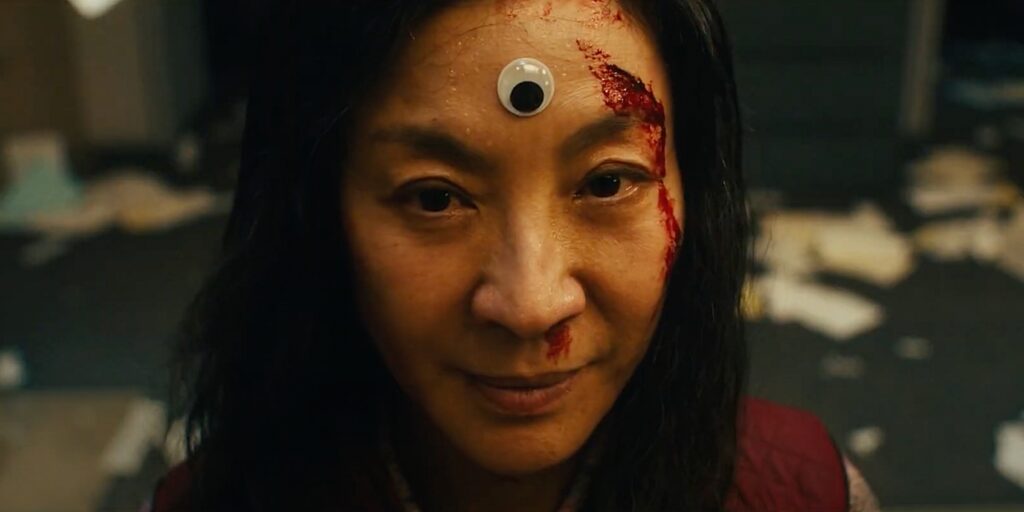
The following article will be a continuation of my article “Que vadis, culture?” from a year ago, where I analyzed different cultural trends and laid out a few hypotheses about successful betting approaches.
Since I managed to turn my worst-ever TV specials season into my best-ever—mostly through using the cultural trends strategy approach I laid out in the previous article—then it feels worthwhile to look into it again and analyze this season through trends more closely.
Notable about this season was that three of the most outstanding success stories (Everything Everywhere All At Once, Käärija, Viggo Venn) were all riding on the same cultural trend and zeitgeist perception, and shared many fundamental similarities—which resulted in quite unprecedented landslide victories in relevant categories for them. It was a “season of zeitgeist”.
As I tried to explain in the previous article, culture is an ever-adapting and ever-changing living entity which you need to “feel”.
Hence, the approach based too much on historical patterns is a very fragile and, in many instances, a naive strategy, as this season most illustratively proved.
Although I was betting on Everything Everywhere All At Once in different categories since early in the season, I cashed out its profits on the Best Picture market too early, mainly for the naive reasons of overthinking the historical and demographic patterns (instead of purely focusing on the current moment & zeitgeist).
Nonetheless, I kept adding to the Director market (all the way down from 7.4 to 1.3) and especially to the Best Actress market (also in live play when Curtis's win for Supporting was confirmed and
Yeoh's odds shortened too little considering how much signal there was in this information)— following my gut feeling that EEAAO had a huge tribal-like passion & cultural zeitgeist backing, and turned it into my most profitable Oscars season so far.
The film awards circuit set a clear tone for the rest of the season for me and helped to maintain my confidence, making my betting decisions mostly based on cultural trends & zeitgeist and more with my heart & gut than too much with my head and rationality-based sentiment, which has led me astray through most of my life.
Although I went big on Sweden to win Eurovision (which was in a way a rational bet), I was still betting considerable five-figure sums on Käärija to win the televote and finish in the top 3. Also, it helped me spot Viggo Venn early when he was still trading around 26-29 for the Semi-Final win
and around 500 to win BGT overall (unfortunately I acted late with the outright bet on as high odds—although I backed it continuously afterward—and my betting mate Jonathan grabbed it first on the market) and to finish with my best-ever BGT result by far.

And were mixing familiarity with a taste of the experimental side and creating a perfect combo: emotionally pleasing while intellectually stimulating.
Their way of storytelling felt quite fresh and edgy for an average viewer, making it an unpredictable ride. That mix of familiarity with a taste of novelty has been a successful formula in many industries and should only be more of a developing trend in culture, considering
consumer awareness has been on the rise—partly thanks to getting more and more exposed to global cultural osmosis—and in the overexposure of information we’re getting more immune
to different established narratives & their supposed impact. We don’t want to be solely predictably entertained; we crave more for novelty and surprise in narratives that hold our attention.
* Some may argue Viggo didn’t tick all the boxes, but I disagree. I don’t think Viggo’s appeal was just senseless unintellectual fun like “Hey Mama” in Eurovision 2017, but he was boosted a lot
through being unpredictable, captivating in his storytelling & character, and offering a slightly surrealistic and edgy fresh-feeling composition of humor as “Cha Cha Cha” did.
As I mentioned a year ago: people in the current era don’t want illusionary fairytales and recycled ideas as much as they used to. Even the recent Barbie movie played on the card of breaking the illusionary and bringing out the realness.
Sincere and positive human elements are the way to our hearts: we want to escape from the noise, negativity, and traumatic recent global happenings to a purely positive & joyful escapism,
which would also lack too much complexity, but at the same time would feel more real and authentic.
As Arnold Schwarzenegger said in a recent interview with CNN, “People are really starving for something positive. There’s so much on social media and online out there that is negative- negative-negative.”
We’re exhausted from negative and sad feelings after Covid, the Ukraine war, and the growing toxic polarization on social media.
And we’re tired of being treated as kids by the status quo, straightforward real truth is more appealing.
Käärija and Viggo both had cult-leader-like qualities in their characters, and their acts had distinctive visions. However silly or non-seriously takeable on the surface, they were both visionaries and their acts represented a style and mindset you feel an urge to tie your identity with and share with your friends to signal how you feel about the world.
The same applies to EEAAO: they all represented and expressed a certain type of similar philosophy and attitude towards life, bringing out our collective unconscious & zeitgeist feelings about how we feel about life/world at this particular moment in history.
Even if we don’t perceive them like that consciously, our consciousness is only rationalizing it in a socially acceptable way, while the unconscious is what really rules our decisions.
They were also doing something creatively and artistically fresh-feeling, which is overall a good strategy to get a cult-like following from people seeking novelty, identity and status through taste.
In a more nihilistic world where there’s a widespread lack of meaning, cult-like acts have even more appeal because they offer, for some of us at least, a brief glimpse of meaning to our lives.
That has been a developing trend for years.
As Tellystats Dan pointed out about “Cha Cha Cha”: “Rarely has a song been so immediately accessible in Eurovision. Europe is a continent where most people don’t speak English, but whether you’re 8 or 80, you can get on board with shouting “CHA CHA CHA.”
While I personally don’t think it’s the sole reason for its success—I prefer to interpret human behavior also through a more detailed fundamental analysis of cultural standings that should set the framework for our conscious experience—he is right about how brilliant & simple “Cha Cha Cha” was.
Something which people from any culture could easily relate to and find catchy, fun & shareable.
Additionally, Käärija had a memorable and flashy character & the overall feel of a simplistic underdog/people’s champ.
You can point out exactly the same strengths for Viggo as a character and for his ski-vis included “One More Time” routine: simple, catchy, memorable, infectious, shareable & original- feeling.
One reason we can’t really predict taste by historical standards is due to its continuous evolution and the flexibility of culture. As W. David Marx puts it in his book “Status And Culture: How Our
Desire for Social Rank Creates Taste, Identity, Art, Fashion, and Constant Change”, culture is largely driven and evolves through the quest for status (mostly on an unconscious level, and most people would deny it when asked).
A group of people (trendsetters) is always craving something new that would give them an edge over most people: something that feels fresh and different from an already existing mainstream trend, making them feel more special and intelligent than the masses (people they want to dominate in cultural/social hierarchy).
Although it’s debatable and I’m a bit skeptical of how much this factor played a role in these certain instances considering how very humanly relatable products they were on a fundamental
level, you could argue that their success was partly boosted by the common human tendency to crave for status. Käärija and Everything Everywhere All At Once are generally examples of this phenomenon. Quite a few more traditional people didn’t initially get their appeal (speculatively, because they thought it signaled “bad taste”), but some of them changed their opinions after seeing people with high status approving them.
They were more edgy and fresh-feeling (also risky), and hence trendsetters hopped on their boat to be different from the crowds—which led many initial skeptics to follow them, creating a snowball effect.
They made you feel like becoming part of a cult or tribe that is ahead of its time and more creatively intelligent than the crowds.
I would draw a parallel in politics: we see similar dynamics in politics when left-leaning people are sometimes influenced by the motivation to show the “dumb, uneducated, and out-of-time conservatives” their place, by supporting certain more progressive policies & ideas.
Knowledge and “good taste” give you power, and many people tend to follow trends as “universal truth” and a source of power.
As also Gert Jan Waterink put it similarly in his Eurovision 2022 forecast, people are tired of lockdowns, etc, and just want to just show
a middle finger to all of it and signal their rebellious attitude in this particular moment in history.
While I would expect Käärija's rebelliousness and “showing the middle finger” attitude to be quite obvious to most people, Viggo Venn used this in a more subtle way: building his routine mostly on a silly dance is a bit of a “fuck off” to conventional expectations in the mainstream for comedy.
His whole attitude was a “I have a character and charisma and you will love whatever I do on stage”. Also, his added features to his comedy later on were mostly about poking fun at judges
(the authorities), which is a fundamentally rebellious act opposing the status quo/hierarchy. He could have been boosted by playing the right card for the zeitgeist—our society’s underlying frustration with the status quo and the system, highlighted globally in recent times

Some of these six trends I've laid out here have also been a reason I've been an early investor in Vivek Ramaswamy for the 2024 US Presidential Election (straightforward realness & truth-seeking, rebelliousness, positivity, novelty).
Even if his character doesn't perfectly match these values, I have found his message to align the most with these among all candidates, and hence I've traded on his rise in popularity.
We, as bettors, all have different approaches to betting and analysis. Some of us are verbal thinkers, and some of us are more visual spatial thinkers.
I personally find a lot of help in analyzing events through macro cultural aspects. I've always also tried the “method acting” principle as a bettor: to feel like the other person, you have to actually become that person.
To put it differently: to understand how the masses will feel and vote, you have to become one of them—not just an observer intellectualizing everything from a distance—to maximize your understanding of the social moment.
Self-focused empathy & role-taking (what Jeremy Rifkin refers to in “The Empathic Civilization” as the most effective empathy strategy), based mostly on mirroring and inter-brain synchronization, are other valuable sources of insight when it comes to predicting human perception.
Though history offers some recurring patterns which have value in analysis, cultural phenomena are mostly based in Extremistan (not in Mediocristan, referring to Taleb’s “Antifragile”) and are very fluid. Hence, history and models can never be the most relevant source for predicting the
outcomes of cultural phenomena.
But we, as bettors, must keep ourselves always open-minded and consider different aspects. It’s a puzzle with many details, and even though cultural zeitgeist may offer the most valuable perspective, it's ever-changing, and we have to consider many other nuances in the big picture.
There’s no “one truth” we can follow; just helpful tools to manage the interconnected system.
Let’s be foxes, not hedgehogs, as referred to in Philip Tetlock’s book “Superforecasters”.
